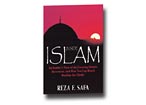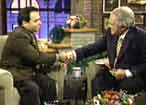He grew up as the youngest of nine in an Iranian family and was taught
that Islam was the way to God. But when pastor and author Reza Safa
traveled to Sweden, he read a book that told him a different story and
he became a Christian.
He discussed Islam with Pat Robertson on The 700 Club.
Pat Robertson: What is Islam? You have written a book called
'Inside
Islam.' I read it last night and I was very interested. What does
it mean? What is Islam?
Reza Safa: Islam is a very complex set of beliefs. But I think
the best way we can describe it is that Islam is a religion of submission.
It really means submission.
Robertson: Submission?
Safa: Submission to all the will of Allah. So Islam means a
total submission and yieldedness.
Robertson: Let me ask you, you're submitted and yielded to Allah.
Who is Allah?
Safa: They believe it's the God that we worship, the one God.
But, of course, his character in the Koran is not the same as the Bible
character of God.
Robertson: So if you're going to submit to Allah, then the next
part of it is that he's got a representative you've got to submit to?
Safa: Right, which is Muhammed and all the people that are leaders
of Islam.
Robertson: They submit to them?
Safa: Absolutely. The faith in Islam is based upon the fundamentals
of one, the Koran, and, two, the lifestyle of Muhammed.
Robertson: The lifestyle of Muhammed?! He married about 12 women,
and I’m not sure it was all that exemplary, was it?
Safa: Well, according to their laws and what they believe, Muhammed
was really sinless. Muhammed is portrayed as the holiest person on planet
Earth. He is a very revered and reverenced person in that religion.
Robertson: There was somebody in your country who was called
the ayatollah. What does that mean?
Safa: He was from the Shiite sect. He was the head of that sect
and they called him 'Ruhollah, 'which means 'the spirit of Allah.'
Robertson: He was the spirit of Allah?
Safa: That's what the Iranian people believed.
Robertson: They thought he was very holy, the holiest.
Safa: Absolutely. His words were the laws of Islam and, of course,
he altered the law and regulations strongly.
Robertson: I read in your book that he put in a reign of terror
that was equaled to what happened in the French Revolution. Tell us
about what he did in the name of Allah.
Safa: I think what we have to understand is that within Islam,
there is this spirit, we could call it jihad, which is what we are facing
today with these groups from Afghanistan, Egypt and other places. To
my belief the jihad is a spirit force that wants to wage war against
everything that is from God, everything that is holy. It is against
freedom. Again, we have to go back to the conception that Islam means
submission, total submission, that it is a theocracy to the max to the
will of Allah.
So when you refuse that, you are counted an infidel or someone that
is, if you will, an enemy of Islam. Whoever resisted Khomeini and his
regime was resisting Allah. When the Iranians started the war with Iraq,
over 1 million Iranians and Iraqis died in that war for no reason.
Robertson: We've been listening on television to people like
Peter Jennings of ABC and he had people saying that these Muslims are
very peace-loving people and that there's nothing in Islam that indicates
war. Tell us what Muhammed actually taught in the Koran.
Safa: Actually, it is not the truth what they have been saying
about Islam, because Islam expanded from the 7th century
to really we can say the 17th century and caused nation after
nation to fall. They have about one billion adherents.
 Robertson: I want to
read something in your book 'Inside
Islam,' taken from Sura (chapter) 9:5 of the Koran. I’m reading
this directly out of the book and this is from the Koran, according
to our guest:
Robertson: I want to
read something in your book 'Inside
Islam,' taken from Sura (chapter) 9:5 of the Koran. I’m reading
this directly out of the book and this is from the Koran, according
to our guest:
'When the sacred months are passed, kill those who join other
gods wherever you find them, and seize them, beleaguer them and lie
in wait for them with every kind of ambush. But if they convert and
observe prayer and pay the obligatory alms, then let them go their way.'
Is that a teaching of Islam?
Safa: That's absolutely the teaching of Islam. It's a spirit
of jihad and those who yield to it, and all these fanatical fundamentalists
are yielding to it, they follow those scriptures.
Robertson: How can somebody come up and say they are peace loving
and don't worry about a thing when this is a teaching? Does the average
Muslim know the Koran? Is he even able to read it?
Safa: They really don't. The majority of Muslims do not know
what the Koran teaches. They have an idea and they hear mainly about
what it says. Most people cannot understand the Koran, because it is
in Arabic and they are told you have to understand the Koran in Arabic
or you don't understand what he's saying. For all these nations that
are not Arab nations, like Persia, like I was, we had to learn it and
study it in Arabic.
Robertson: But you don't really speak Arabic fluently?
Safa: No, I don't. It's a foreign language to me. What we have
to understand here, Pat, is that there are two sections to Islam. The
majority of Muslims are wonderful, loving, hospitable people. We want
to differentiate between them and these groups that are yielding to
that spirit of jihad. Once they yield to that spirit, it's a very vengeful,
hateful, demonic, spirit of death.
Islam has two major spirits that we have to watch out for. Number one
is terror, fear. It creates fear and then rules in that fear. Number
two is the spirit of death and war and waging war.
Robertson: Is this accepted? You say that so many of the Muslims
are very peace loving, hospitable people. They tolerate these people,
don't they? Or do they? They feel they're co-religionists, or don't
they feel that?
Safa: Within them there is that feeling that I used to have
of, ‘Hey, this is part of what we believe in and we have to fight
for it.’
But I guess it is like Christians. We have Christians that we call
charismatics, who believe in the Holy Ghost and praying for sick people
and speaking with other tongues. But then there are millions of Christians
that haven't yielded to that baptism and they don't walk in it. So the
difference is between those who yielded to that spirit of Islam and
those who don't believe in it.
Robertson: How extensive are those who have yielded to it? What
are we up against? I know there are a billion people who subscribe to
Islam and they're growing at 50 million a year, according to your book.
How many have yielded to this jihad spirit?
Safa: I can tell you we are in a very serious time, and most
of the commentary I hear, they do not understand what we are coming
up against because this is not a group or a sect or a certain number
of people. This is a spirit that is growing, and we really need to pray.
We are really coming up against something that is very serious.
Robertson: It is permeating these countries like Iran, Iraq,
Pakistan, North Africa and Sudan.
Safa: Egypt is the most dangerous place that I know of. Algeria,
another country, very serious people.
 Robertson: What happened to you? You
went to Sweden and something opened your heart.
Robertson: What happened to you? You
went to Sweden and something opened your heart.
Safa: I saw the love of Jesus.
Robertson: Is that it?
Safa: It changed me. Oh yes, the pure, solid, raw love of God.
Robertson: You never had that before?
Safa: During all these years of prayer and fasting I never experienced
it.
Robertson: It was the love of Jesus that just melted you?
Safa: It did. It broke me.
Robertson: There are many Muslims who must be seeking like you
are.
Safa: Absolutely, especially during this time. We need to love
Muslims. We have six to eight million Muslims in America and we need
to love them.
A caring friend will be there to pray with you in your time of need.